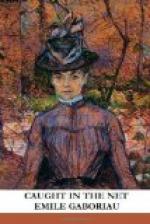“Yes, I will. My mother is still in her dressing-room, and no one will venture to disturb my father in the library. If I meet M. de Breulh-Faverlay in the hall and take him into the drawing-room, I shall have time for a quarter of an hour’s talk, and that will be sufficient.”
Calling up all her courage, she left her room on her errand. Had Andre seen the man selected by the Count de Mussidan for his daughter’s husband, he might well have been proud of her preference for him. M. de Breulh-Faverlay was one of the best known men in Paris, and fortune had showered all her blessings on his head. He was not forty, of an extremely aristocratic appearance, highly educated, and witty; and, in addition, one of the largest landholders in the country. He had always refused to enter public life. “For,” he would say to those who spoke to him on the matter, “I have enough to spend my money on without making myself ridiculous.” He was a perfect type of what a French gentleman should be—courteous, of unblemished reputation, and full of chivalrous devotion and generosity. He was, it is said, a great favorite with the fair sex; but, if report spoke truly, his discretion was as great as his success. He had not always been wealthy, and there was a mysterious romance in his life. When he was only twenty, he had sailed for South America, where he remained twelve years, and returned no richer than he was before; but shortly afterward his aged uncle, the Marquis de Faverlay, died bequeathing his immense fortune to his nephew on the condition that he should add the name of Faverlay to that of De Breulh. De Breulh was passionately fond of horses; but he was really a lover of them, and not a mere turfite, and this was all that the world knew of the man who held in his hands the fates of Sabine de Mussidan and Andre. As soon as he caught sight of Sabine he made a profound inclination.
The girl came straight up to him.
“Sir,” said she, in a voice broken by conflicting emotions, “may I request the pleasure of a short private conversation with you?”
“Mademoiselle,” answered De Breulh, concealing his surprise beneath another bow, “I am at your disposal.”
One of the footmen, at a word from Sabine, threw open the door of the drawing-room in which the Countess had thrown down her arms in her duel with Dr. Hortebise. Sabine did not ask her visitor to be seated, but leaning her elbow on the marble mantel-piece, she said, after a silence equally trying to both,—
“This strange conduct on my part, sir, will show you, more than any explanation, my sincerity, and the perfect confidence with which you have inspired me.”
She paused, but De Breulh made no reply, for he was perfectly mystified.
“You are,” she continued, “my parents’ intimate friend, and must have seen the discomforts of our domestic hearth, and that though both my father and mother are living, I am as desolate as the veriest orphan.”




